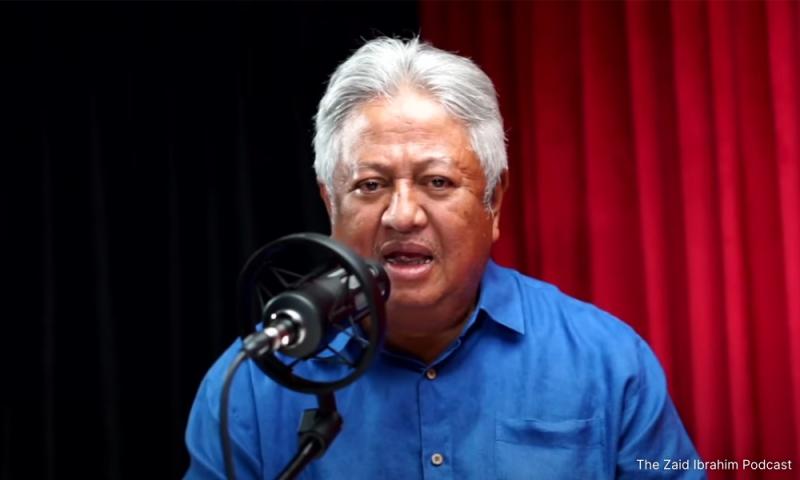That the Chinese Communist Party wants the world to forget the Tiananmen Square massacre of June 4, 1989 is the best reason I can think of for forever reminding ourselves of this atrocity.
Of course the actual killing spree itself happened under cover of darkness, and the Chinese authorities have ever since tried to shroud it with secrecy and lies.
But for those of us who were following events from the safety of our free-world TV screens, the event is forever imprinted in our memories by the pre-massacre sight of a lone, anonymous, unarmed man blocking a line of tanks.
If ever an image exposed the fundamental falsehood of a disgusting regime’s self-perpetuating propaganda, this was it: a solitary representative of the people facing down the so-called ‘People’s’ Army in the so-called ‘People’s’ Republic.
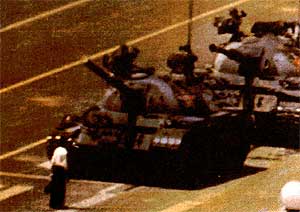 Small wonder that, in the 20 years since it was captured on film, this solitary act of defiance by an unknown and still unidentified citizen has become a classic in the iconography of the fight for human rights in the face of totalitarian might.
Small wonder that, in the 20 years since it was captured on film, this solitary act of defiance by an unknown and still unidentified citizen has become a classic in the iconography of the fight for human rights in the face of totalitarian might.
But unfortunately it doesn’t seem to have had much effect on the ‘People’s’ government in Beijing. State censorship is as vicious as ever in today’s ‘People’s’ Republic, with words and phrases like ‘Tiananmen’, ‘June 4', ‘democracy’ and many other terms redolent of political liberty still banned from all media, and many activists from the Tiananmen era still in jail or exile.
The appalling levels official injustice and corruption that the students and workers of Tiananmen were protesting against 20 years ago are still very much in evidence. More so, in fact, now that China has declared itself capitalist.
The ‘liberalising’ of the Chinese economy appears to some to be a sign that the potentates of the Communist Party have finally been persuaded to put the people into their concept of ‘People’s’.
But, as many workers and entrepreneurs as it has raised to levels of previously undreamed-of avarice and affluence, I suspect that China’s economic so-called ‘miracle’ has been engineered more for the glory and power of the state than for the benefit of its still-enslaved citizens.
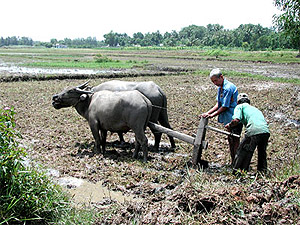 Millions upon millions of ‘migrant’ workers from the endless ranks of the rural poor are exploited like so many expendable serfs in the sweatshops of the squalid new instant cities.
Millions upon millions of ‘migrant’ workers from the endless ranks of the rural poor are exploited like so many expendable serfs in the sweatshops of the squalid new instant cities.
Miners still die in world-record numbers in the coal-pits that feed the money machine. And the parents of the countless children killed by the collapse of shoddily-built schools in the earthquake a year ago still cry in vain for an inquiry into construction fraud and corruption.
Meanwhile, as John Garnaut pointed-out in the Sydney Morning Herald recently, employees’ and households’ shares of the economy have fallen so low that the Asian Development Bank now ranks China as “the most un-egalitarian nation in Asia, equalled only by Nepal”.
Ludicrous falsehood
The callousness and criminality of the ‘People’s’ Republic would be tragic enough if it was confined, as through most of China’s long history, to the inhabitants of the country itself. For many centuries, as we all know, a string of emperors considered it their personal, exclusive property and set the peasants to work building walls to keep foreign riff-raff at bay.
But the Great Wall, or ‘Wall of Tears’ as the Chinese people of the times referred to it - so many millions of their countrymen having died in its construction - has never been enough to contain the ambitions of the emperors’ successors, the commissars of the Communist Party.
As more elderly readers will recall, Communist China’s first notable foray into international affairs was its military support of the North in the Korean War. This conflict gave me, just a schoolboy at the time, my first insight into the falsehood of the ‘People’s’ part of the name ‘People’s Republic’: news of the use by the ‘People’s’ Army of what became known as the ‘human wave’ tactic.
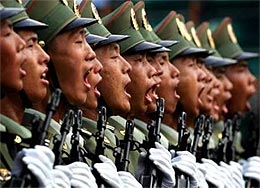 This consisted simply of driving the ‘People’s’ soldiers to attack UN positions in such overwhelming numbers that the defenders eventually ran out of enough ammunition to kill them all.
This consisted simply of driving the ‘People’s’ soldiers to attack UN positions in such overwhelming numbers that the defenders eventually ran out of enough ammunition to kill them all.
Despite such rank contempt for the cost in the corpses of its conscripts, however, the ‘People’s’ forces and their allies lost the war, though China and its North Korean cronies have never conceded defeat. It’s a ludicrous falsehood to which the unfortunate North Korean people have been held hostage ever since, in a state of total isolation and utter deprivation.
Communist China’s next attempt to export its pernicious ‘People’s’ influence was apparently more successful politically, though no less disastrous to the actual people concerned, the take-over of Tibet.
This is still ongoing, of course, to the outrage of lovers of liberty everywhere, and is again a demonstration of the human-wave approach. In this case swamping the target territory with not waves of suicidal soldiers, but enough settlers to dominate the locals by sheer weight of numbers.
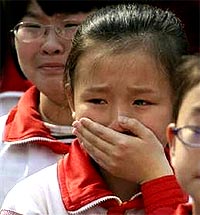 Another demonstration of the fact that, whatever else the China may or may not have going for it, it always has a ready supply of expendable human beings.
Another demonstration of the fact that, whatever else the China may or may not have going for it, it always has a ready supply of expendable human beings.
This is ultimately why I’m so implacably opposed to the political philosophies of the ‘People’s’ Republic: in stark contradiction to its name, it has no respect or regard for people, in its own country or anywhere else, as free, self-determining individuals.
In fact it clearly views people as nothing but pawns and peasants; as an endlessly renewable resource to exploit for the purposes of the party and its cronies.
As wantonly as it squanders its human resources, as in the wholesale slaughter of the Korean War, the 30 million famine victims of the ‘Great Leap Forward’ or the purges of the ‘Cultural Revolution’, there’s always plenty more cannon-fodder for a relatively small-scale massacre like Tiananmen Square, and to sate the state’s insatiable appetite for executing unjustly-tried suspects.
In the face of such a record of inhumanity, let’s remember that 20 years on from June 4, 1989, the ‘People’s’ Republic is still an intolerable burden on the people of China.
And that, through its economic and military clout, its power of veto in the UN Security Council and its support of like-minded regimes everywhere from North Korea and Burma to the Sudan and Zimbabwe, it’s the mortal enemy of us common people everywhere.


